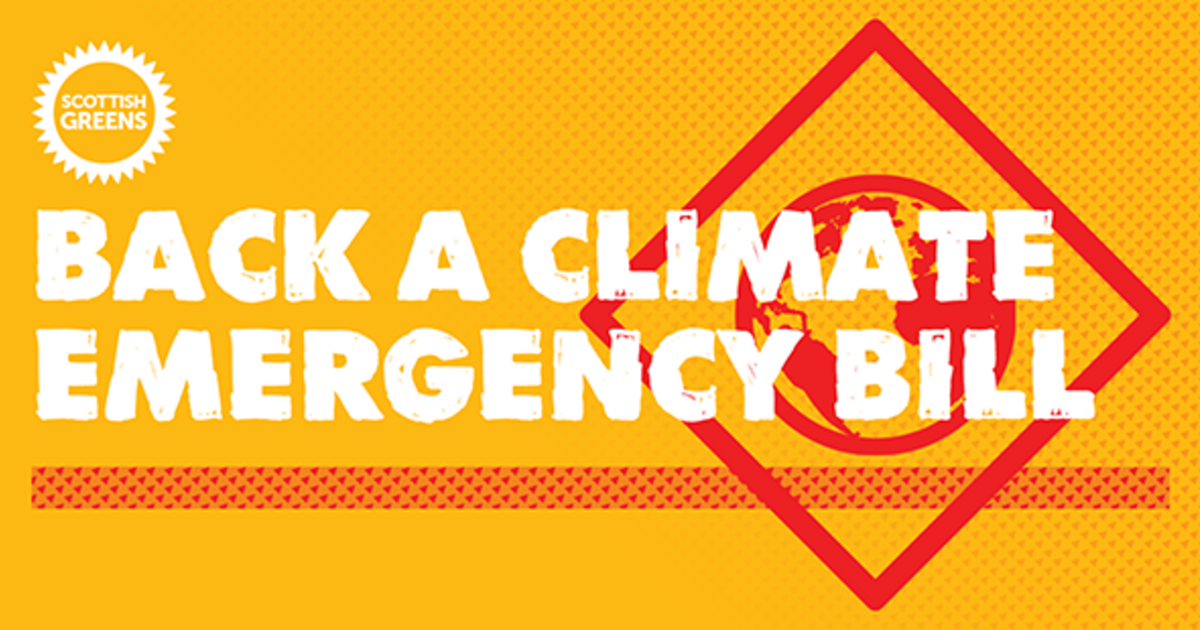Why Scotland needs a climate emergency bill

The First Minister was in Katowice this week at the latest round of international climate talks, where she warned against climate complacency and spoke of increasing Scotland’s ambition in response to the latest reports from the Intergovernmental Panel on Climate Change (IPCC).
Greens welcome that and today we ask her to start putting these words into action by transforming the proposed climate bill, which does not propose to accelerate our emission cuts, into a climate emergency bill that truly earns Scotland the position the First Minister seeks as a global climate leader.
Our new campaign asks for three measures to strengthen the current bill. First, we believe it must commit to a target to reach net-zero greenhouse gas emissions by 2040. That would keep Scotland as one of the front-runners globally; anything less would risk seeing slower emission cuts than we’ve achieved in the last decade. Secondly, we want a much more ambitious interim target for 77% reduction by 2030, reflecting the urgency demanded in light of the IPCC report. And finally, because targets alone won’t drive change, we demand a radical action plan to follow within one year of the Bill passing.
When JFK announced in 1961 that the USA would send people to the moon by the end of that decade, there was no plan for how this would be achieved. The tech didn’t even exist yet. But Kennedy created the political urgency that propelled innovation and success. The climate emergency needs the same vision, ambition and drive. Greens have shown that we’re willing to lead the way, but others need to up their game.
A Climate Emergency Bill isn’t just the right thing to do for our planet. It’s the right thing to do for Scotland too. Scottish Greens’ research found that 200,000 green jobs could be created over the next decade if we pursue ambitious, rapid decarbonisation. The benefits don’t end there: air quality would improve, fuel poverty would be eradicated, and rural Scotland would benefit from massive reforestation, peat restoration and local, low-carbon food production.
The IPCC report makes clear why we must act in its stark predictions what will happen if we don’t keep surface warming within 1.5 degrees. We’re already witnessing a dangerous change in the global climate. This summer Europe saw prolonged heatwaves and wildfires, following on from one of the coldest winters in Europe for decades. Across the world, extreme weather events are becoming more frequent, more intense and more damaging.
There are those who will argue that Scotland’s not doing badly, while others around the world refuse to pull their weight. That’s partly true. We have achieved a massive shift away from coal to renewable power, while some of the world’s most polluting countries are pursuing economic nationalism and outright climate denial. But if we’re going to effect change in the world, we have to do that by leading.
More to the point, the climate crisis is about hard science, not mere positioning. Just doing ‘not badly’ is simply not enough. We need to meet the demands of the planet, or we fail. No country is yet doing that, and being ahead of a lethargic pack is nothing to be proud of.
There are others who make the spurious claim that we’re at the limit of what’s possible with current technology. Whether by massively increasing our spending on walking and cycling or renewable heating, or whether by diverting subsidy away from fossil fuels and agri-business towards new clean industries or climate-friendly farming, there’s far more the Government can and should be doing.
It’s also vital that we recognise the pace of change in green technologies. For example, the Whitelee windfarm on the south of Glasgow is just ten years old, but if it was being built today, using the latest turbine technology, it could use 50 per cent fewer turbines to generate the same amount of power.
Other countries around the world are upping the ante. The influence of Greens in government can be seen in both Iceland and New Zealand, countries which share many similarities with Scotland, which have set out plans for bold zero emissions targets.
Today, Greens are taking our calls to the people, asking them to back our climate emergency campaign. Recent weeks have seen the energy of new activists, many of them young, first-time campaigners, coming together to challenge governments and powerful business interests under the loose banner of Extinction Rebellion.
Together, we will stand up to the vested interests who continue to block progress. We will challenge all those committed to maximum extraction of oil and gas from the North Sea because we know that avoiding dangerous climate change means that the majority of fossil fuels must remain in the ground. We will also oppose airport expansion and tax cuts designed to grow air travel and the obsession with building more roads instead of investing in transforming our woeful public transport. Only the Greens are standing up for our common future, against the vested interests and dirty money of the fossil fuel industry.
